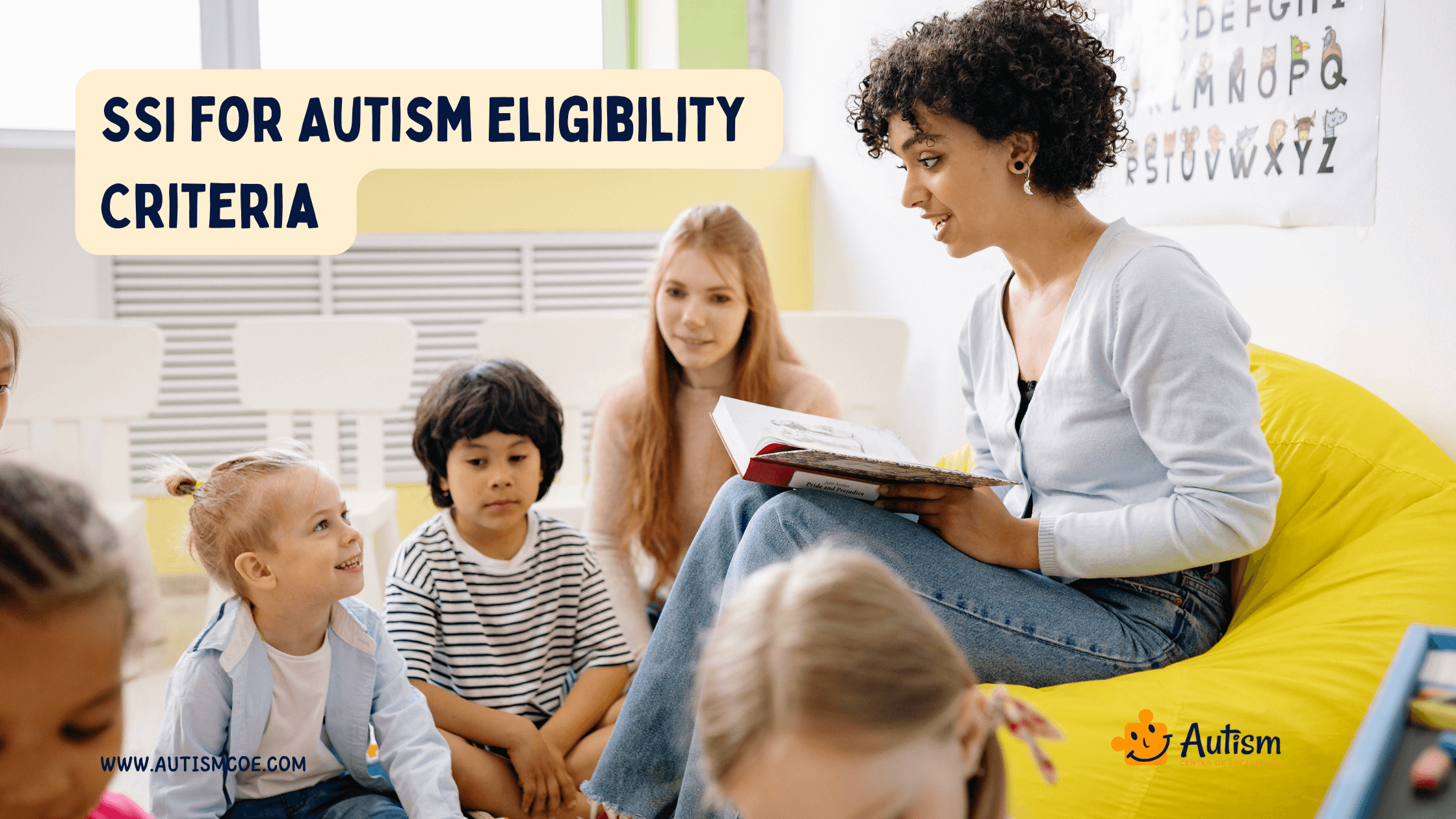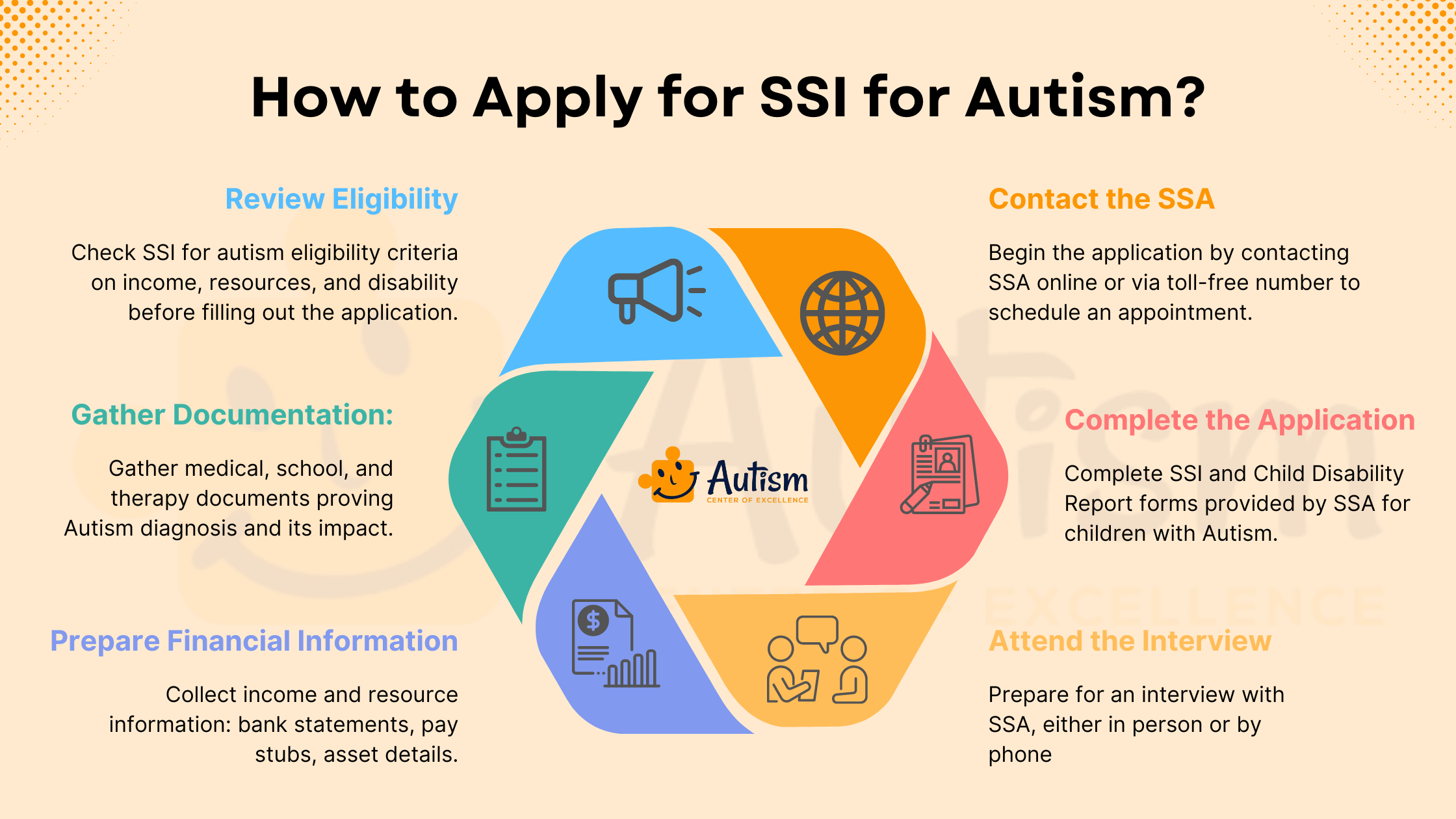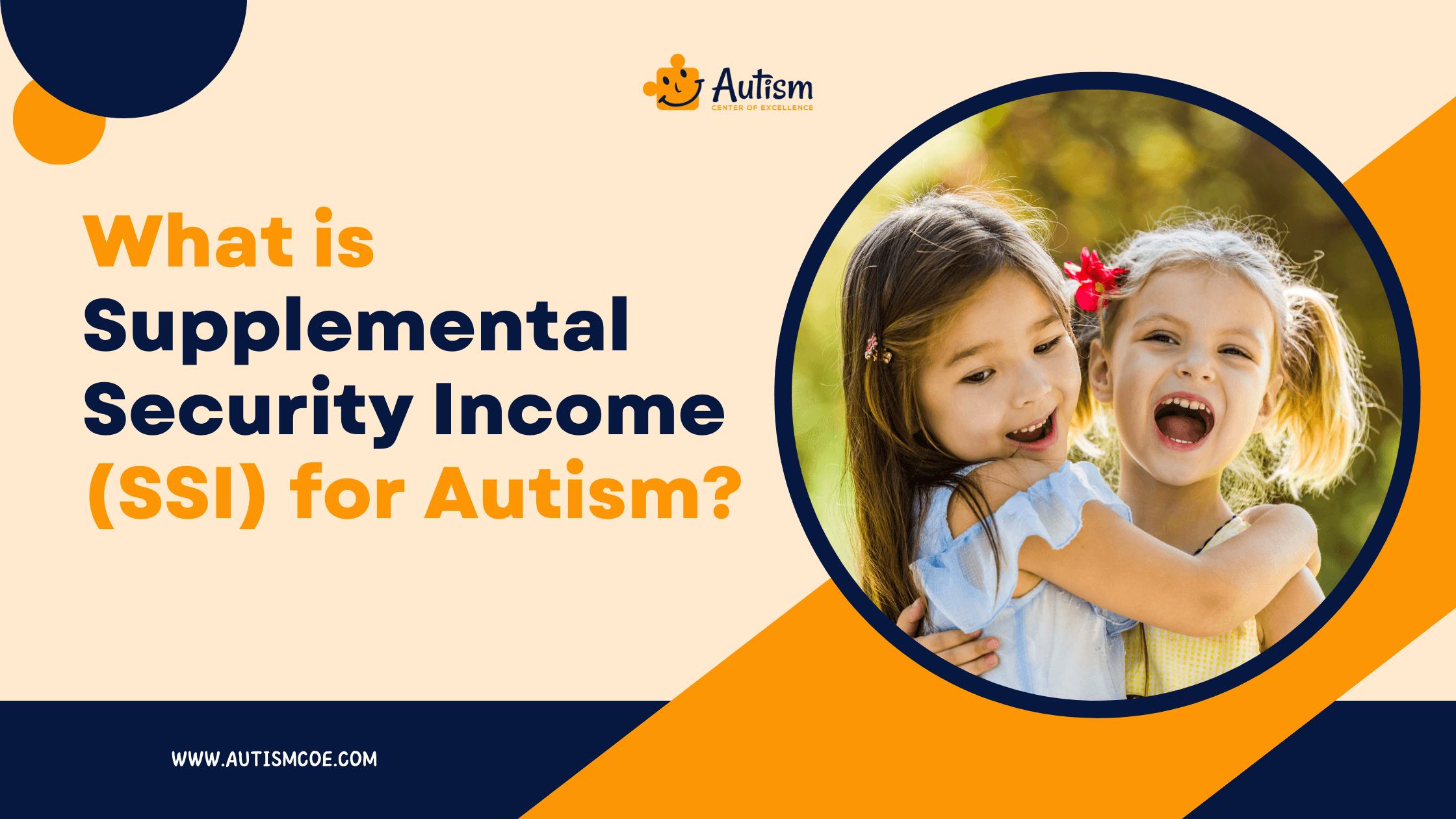The world of financial assistance for children with Autism is quite complex and terrifying to navigate. One of the major resources that the SSI (Supplemental Security Income) program is known for is the help it gives to disabled people, among them those who suffer from Autism, in getting basic needs like food, clothing, and shelter. This article is designed to clarify the SSI for Autism, thus it deals with the eligibility, the application process, and the management of benefits.
Understanding SSI for Autism
Supplemental Security Income (SSI) is a program run by the Social Security Administration (SSA) that gives monthly payments to people who are disabled, for instance, those who have Autism Spectrum Disorder (ASD) and have little income and resources. The main purpose of this financial help is to help the disabled to pay for their basic needs such as food, clothing, and shelter, so that they can have a more comfortable life.
SSI benefits are the lifeline for children with Autism. Autism is defined by the SSA as a condition that can drastically reduce a child’s capability of doing activities daily like those of children of their age who do not have disabilities. The eligibility for SSI benefits is decided by the degree of autism and its effect on the child’s functional abilities.
From the child’s date of birth, he or she may be entitled to SSI disability benefits, without the need for a minimum age. Therefore, from the moment an autistic child is diagnosed with the disorder, SSI for autism becomes a very important resource for families, since it can be used to pay for different needs, such as medical treatment, behavioral therapy, and other essentials that make the life of children with ASD better.
The SSI benefits a child with Autism can get, are different for each family and they depend on the family’s income and resources. However, the goal remains the same: to provide a security blanket that helps in the payment of all the expenses connected with the child’s care and health.
SSI for Autism not only stands for financial help but also frequently grants access to Medicaid which can further reduce the medical expenses that usually go hand in hand with autism care. This dual advantage guarantees that children with autism get both the financial help and medical treatment that is needed for their growth and good health.

SSI for Autism Eligibility Criteria
SSI for Autism eligibility standards are based on income, resources, disability, and residency criteria. Actually, the criteria for children with disabilities such as Autism are the severity of the condition and its impact on the individual’s capacity to function in daily life. Here is a thorough explanation of the general and disability-specific eligibility criteria for SSI.
✅ Income: The main target group of SSI is people with low income. This encompasses the income from the job, as well as the pensions, Social Security benefits, and other forms of income. The Social Security Administration (SSA) takes into account the income that is both earned and unearned in the determination of eligibility.
✅ Resources: The people who are eligible for SSI must be those who have the least resources. Resources are the items that one can easily convert to cash and use for food or shelter. They are things like cash, bank accounts, stocks, U. S. savings bonds, land, vehicles, personal property, life insurance, and everything else that can be changed to cash. The resource limit for individuals is $2,000 and for couples, it’s $3,000.
✅ Residency: An applicant must live in the United States or the Northern Mariana Islands and be either a U. S. citizen, a national, or in some categories of non-citizens.
✅ Other Factors: Applicants must not be away from the country for a whole month or for 30 consecutive days or more.
For Autism Spectrum Disorder (ASD), the SSA has specific criteria under which an individual’s condition can qualify as a disability:
✅ Medical Documentation: The SSA needs to have a complete medical report of the diagnosis of Autism. This consists of a complete developmental history, clinical observations, standardized test results, and an accurate description of the person’s functioning from reliable sources.
✅ Qualitative Impairments: The person must manifest the qualitative deficiencies in verbal communication, nonverbal communication, and social interaction.
✅ Financial Requirements: SSI for Autism eligibility is also determined by the specific financial conditions one has to meet. Only the people with the income and resources below a certain level are eligible for the benefits. The specific income and resource levels are different for different people based on factors like marital status, living arrangements, and other sources of income.
✅ Functional Limitations: Autism should be so severe in children that it will make them unable to perform age-appropriate activities. For adults, the condition has to be of such a degree that it is very hard for them to perform basic work activities. These limitations are examined in the areas of understanding and using information, interacting with others, concentrating and maintaining pace in tasks, and adapting or managing oneself.
✅ Severity of Condition: The SSA checks whether the condition is equal or medically equal to the criteria mentioned for Autism Spectrum Disorder. If the condition fails to satisfy these criteria, the SSA proceeds to the next step which is to determine whether the condition is functionally equal to the severity of a listing by examining how the condition affects the child’s functioning.
These eligibility criteria are the key factors for the successful application for SSI benefits for children with autism. The collection of all the medical reports and documentation that precisely describe the diagnosis, symptoms, and functional limitations of autism is a must. Since the SSI for autism eligibility criteria are so complicated, applicants usually get the support of legal representatives or disability rights advocacy groups to help them navigate the application process better.

How to Apply for SSI for Autism?
The application for the SSI for a person with Autism is a very difficult process, which requires the collection of a lot of documents to prove the eligibility based on the disability and the financial need. The following is a full explanation of the step-by-step procedure, the documents that are needed, and the advice for a good application.
Step-by-Step Guide on How to Apply
- Review Eligibility: Before you start to fill in the application form, go through the SSI for autism eligibility criteria which are concerned with the income, resources, and disability requirements to make sure that the person with Autism is eligible.
- Gather Documentation: All the medical, school, and therapy documents that prove the diagnosis of Autism and its impact on the daily life and capabilities of the child have to be gathered.
- Prepare Financial Information: Gather the information about the income and resources which are the bank statements, pay stubs, and asset information, to prove that you are in need of financial aid.
- Contact the Social Security Administration (SSA): You can start the application process by contacting the SSA in two ways – online via their official website or by calling their toll-free number to make an appointment. You can also go to your nearest Social Security office, but it is preferable to call and book an appointment in advance.
- Complete the Application: Fill out all the forms that the SSA has provided you with. In the case of children with Autism, you will have to both the Application for Supplemental Security Income (SSI) and the Child Disability Report.
- Attend the Interview: The SSA might want to have an interview, that can be done in person or by phone to talk to you about your application and to ask you for any details clarification.
Required Documents and Information
To successfully complete the SSI application for Autism, be prepared to provide:
- Proof of Age: Birth certificate or any other document showing the age of the person.
- Social Security Numbers: It is for the applicant and all the other family members who reside in the same house.
- Medical Records: The Autism diagnosis, treatment records, and information about how the condition affects daily functioning are the things that are in the documentation. It is also the reports from doctors, therapists, and schools.
- Financial Information: The details of the income and resources including the bank account statements, the ownership of the property or vehicles, and any other assets.
- School Records: In the case of children, the IEPs, the teacher observations, and the standardized test scores if any, are the factors to be taken into account.
Tips for a Successful Application Process
- Be Thorough: Provide the whole and the right information in every section of the application. The absence of important data or the choice of the wrong data can result in the postponement or rejection.
- Organize Your Documents: The copies of all the documents you presented during the application process should be kept. Classifying them in a file will help you to be prepared for any other questions or calls.
- Communicate Effectively: In the interviews or the communications with the SSA, be specific about how Autism is affecting the person’s ability to do the daily activities and to live independently.
- Seek Assistance: Consider a lawyer or an advocate who is a specialist in disability benefits for this. They can be a great way to seek for help during the application process.
- Be Patient: The SSI application process for a disability claim can take for many months. After you have submitted the application, you will receive the decision in a written form. If the decision is negative, you can appeal.
By going through these steps, you will be able to collect the right documents and get ready which will in turn, boost your chances of a successful SSI application for a person with Autism.
Join Our Weekly Newsletters!
Subscribe now to stay updated with our latest email updates.

Benefits of SSI for Autism
SSI is the main source of financial aid for people with Autism, making their lives and the lives of their families more manageable and supportive. Here are some of the key benefits:
1️⃣ Monthly Financial Assistance:
SSI gives monthly payments to persons with Autism who are eligible for that. This financial support is the lifeline for many people to meet basic needs such as food, clothing, and housing, especially for those who are the most underprivileged or have no income or assets.
2️⃣ Eligibility from Birth:
The SSI benefits for children with Autism may be received from the day they are born. There is no minimum age limit, hence the families can get the support soon after the diagnosis, and the financial burden will be reduced from an early stage.
3️⃣ Support for Low-Income Families:
SSI is a program that is designed for individuals and families who have a low income and few resources. This way, the aid that the most vulnerable groups, such as poor families with autistic children, need is provided.
4️⃣ Catering to Special Needs:
SSI recognizes the specific problems of people on the autism spectrum and their families. SSI, through the monthly payments, assists in the bearing of the expenses related to the special care, therapies, and other indispensable services that a person with autism may need.
5️⃣ Access to Healthcare:
In most cases, people who get SSI benefits also have the right to receive Medicaid. This makes it possible to obtain healthcare services that are very important for the treatment of Autism Spectrum Disorder and related diseases efficiently.
6️⃣ Educational Resources:
SSI financial assistance can also assist families in paying for the special educational programs and resources designed for the special needs of children with autism. The above-mentioned resources are the key factors in the child’s development and learning.
7️⃣ Assistance with Employment:
For adults with Autism, the SSI benefits can also be a way to enter the work programs. These programs are designed to upgrade job skills and make individuals more independent by providing the chance to work in a supportive environment.
It is of great importance for the families and individuals who are seeking SSI benefits for autism to collect all medical records and documents that show that autism has a great effect on their daily lives. The eligibility criteria are that the person must show that the disability has affected his/her ability to do the work that earns real money and that he/she is within the income and resource limits the SSA has set.
How Much Does a Child with Autism Get From SSI?
2024 is the year when the amount of money a child with Autism can get from the Supplemental Security Income (SSI) has been changed and now the monthly maximum Federal amount is $943 for an eligible individual. However, it should be made clear that the way a child with Autism is paid by the SSI may be different because of some other factors such as the family’s income, the state they live in, and any in-kind support and maintenance the child gets.
The students who are 22 years old and below can take out $2,290 a month and with an annual limit of $9,230 from their income for SSI purposes. This clause enables young disabled people to work and earn some money without the risk of their SSI benefits being drastically reduced.
The SSA examines the income and resources of the family when they want to determine if a child is eligible for SSI benefits. Deeming is the method by which the income and resources of one or both parents or guardians are taken into account as if they were the income and resources of the child. Therefore, the richer the family is and the more they have, the less the child will get of SSI.
Thus, it is crucial for the families that are applying for SSI for a child with Autism to honestly report all their income and assets, as well as any changes in their financial situation to get the correct benefit amount. Besides, the states that offer the extra payments may have their own conditions and application procedures, therefore it is better to ask the local agencies for the specific rules and amounts.
The most reliable and accurate advice on the SSI benefits for a child with Autism is given by the SSA or the official website of the SSA. SSA is equipped with the means and resources that can assist families to know the amount of support they are entitled to and lead them through the application process.
Frequently Asked Questions & Answer
Do All Kids With Autism Get SSI?
No, not all kids with autism qualify for Supplemental Security Income (SSI). Eligibility for SSI depends on the child’s specific condition and how it affects their functional capabilities, in addition to the family’s income and resources. The child’s autism must meet the Social Security Administration’s (SSA) criteria for disability, demonstrating significant functional limitations. Additionally, the family’s financial situation must fall within the SSA’s income and resource limits.
Can a Child With Autism Be Denied SSI?
Yes, a child with autism can be denied SSI if they do not meet the eligibility criteria for disability as defined by the SSA or if the family’s income and resources exceed the established thresholds. Furthermore, insufficient medical documentation or failure to demonstrate that the autism significantly impairs daily functioning can also lead to a denial.
Is It Hard to Get SSI for Autism?
Obtaining SSI benefits for a child with autism can be challenging due to the stringent eligibility requirements set by the SSA, both in terms of the disability itself and the financial criteria. The application process requires detailed medical documentation and often thorough evidence of how autism affects the child’s daily life and functioning. Ensuring that all documentation is complete and accurately reflects the child’s condition can improve the chances of approval, but it can be a complex and time-consuming process.
How Long Does It Take to Get SSI for a Child With Autism?
The time it takes to receive a decision on an SSI application for a child with autism can vary widely. After submitting an application, it generally takes three to five months to receive a decision, but this timeline can vary based on the completeness of the application, the need for additional medical records, or the requirement of an SSI interview. In cases where additional information or clarification is required, the process may take longer.
What Can I Spend My Child's SSI Money on?
SSI benefits received for a child with autism should be used for the child’s personal needs and care, primarily focusing on expenses that contribute to their health and well-being. This includes housing, food, medical and dental care not covered by insurance, educational expenses, personal care items, clothing, and rehabilitation or therapy expenses. It’s important to keep records of how the SSI benefits are spent in case the SSA requests an accounting of the expenditures to ensure the funds are being used appropriately.
Conclusion
SSI (Supplemental Security Income) is a very significant financial help for children with Autism, which can provide the basic needs and hence, improve the life quality. Even though the application process might seem to be complicated, with the right preparation and understanding of the system, the applicant can be successful. Remember, you are not the only one — there are many resources and communities to assist you and be there for you on this journey. The Autism Center of Excellence (AutismCOE) is a great assistance to children with autism and their families as it provides information, resources, and support that are tailored to them. AutismCOE is the entity that can tell you the qualification conditions, assist you in the collection of the necessary papers, and even give you advice on how to go about the SSI application process. AutismCOE offers ABA Therapy, Autism Early Intervention Program, Autism School Readiness Program, Speech Therapy, and Occupational Therapy services for children aged 2 – 14 years in-home as well as in center-based environments. Begin with the first step of getting the support you or your loved one deserves by investigating the SSI benefits and do not be afraid to contact AutismCOE for the special advice and help that can change everything.
Please Note: The content of this blog is for informational purposes only and should not be considered a substitute for professional medical advice, diagnosis, or treatment. Consult a qualified health care professional for personalized guidance tailored to your specific situation.

Bhavika Bhasin
Bhavika Bhasin is the Research and Marketing officer at AutismCOE. She works with children and adults with ASD. Her clinical research includes evaluating various available autism screening and diagnosis methods and their efficacy. She is currently developing a novel screening exam that is indicated to be more accurate than the existing available exams. She is also writes articles papers for various publications.


